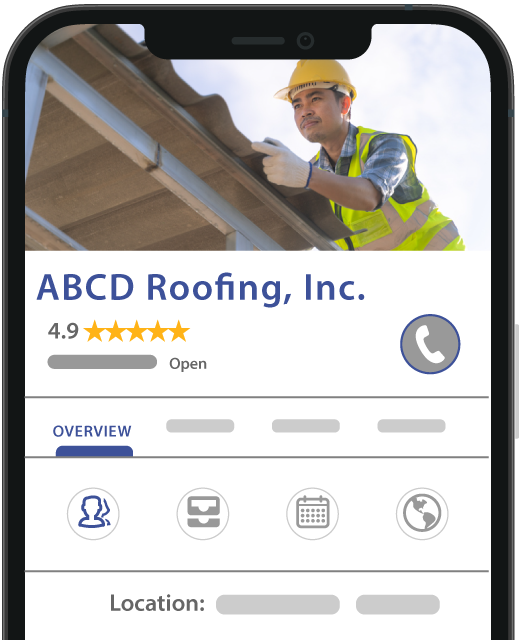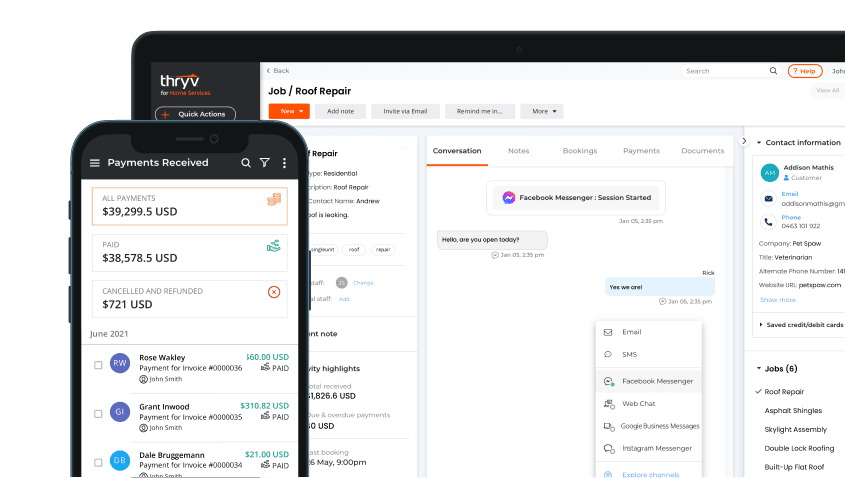Thinking about starting an electrician business? You’re in good company. Skilled electricians are always in demand, and with the right plan, you can build a profitable and rewarding career on your own terms.
Starting an electrician business does take some planning, but it doesn’t have to be overwhelming. With the right steps — and the right tools — you can create a business that runs smoothly and keeps customers coming back. This guide walks you through how to start an electrician business, from planning, certifications, and licenses to equipment, marketing, and customer management.
Getting your business off the ground
Every successful electrician business starts with a thoughtful business plan. Before you buy tools or launch a website, spend time clarifying how your business will work. The more you prepare now, the smoother things will run once you start taking on jobs.
Choose your specialty
Electricians can focus on residential projects like wiring homes, commercial work for offices and buildings, or specialized services such as security systems or emergency repairs. Defining your specialty helps you decide what tools you’ll need, what training to emphasize, and how to market your services to the right audience.
Research your local market
Look at other electricians in your area to see what services they offer and how much they charge. Pay attention to what’s missing — maybe no one offers 24/7 emergency service or EV charger installation. Knowing where there’s a gap in the market helps you fill the void, stand out, and win more customers.
Plan your finances
Starting an electrician business comes with costs like licensing, insurance, tools, a vehicle, and marketing. Write out a budget that includes your one-time startup expenses and your ongoing monthly costs. Then figure out how many jobs you’ll need to book each month to break even and make a profit.
Write a business plan
You don’t need a long, formal document, but you should map out your goals, services, pricing, and strategies for finding customers. A written plan gives you direction and also makes it easier to apply for loans or permits.
Secure financing
Not everyone has enough cash to cover startup costs right away, and that’s okay. Explore options like small business loans, lines of credit, or equipment financing. Some electricians also use personal savings or funding from friends and family. Having a financing plan ensures you can buy what you need without putting unnecessary stress on your cash flow.
With these essentials in place, you’ll be ready to move forward with confidence and fewer surprises as you grow your electrician business.
Making your business official
Before you start booking jobs and collecting payments, it’s important to make sure your business is set up correctly. Handling these legal steps upfront not only keeps you compliant but also makes your business look more professional to customers.
Register your business
Choose a legal structure and register it with your state. Many electricians start with an LLC (limited liability company) because it separates personal and business assets, giving you some protection if something goes wrong. A sole proprietorship is simpler and may work if you’re starting small, but it doesn’t provide the same legal protection. If you’re unsure, talk with a small business advisor or accountant to decide which option is best for you.
Get licensed
Most states, cities, or counties require electricians to hold a valid license before they can take on paid work. Requirements vary, but usually include a combination of classroom training, on-the-job hours, and passing an exam. Holding the right license shows you’ve met industry standards and builds customer trust. Always check your local regulations so you know exactly what’s required.
Earn your certifications
Beyond a license, certain certifications can strengthen your reputation. For example, journeyman or master-level certifications demonstrate your skill level. Specialty training — like solar installations or smart home wiring — can also set you apart. Having the right electrician certification can open doors to bigger projects and higher-paying jobs.
Secure the right insurance
Running electrical jobs comes with risks, and insurance protects both you and your customers. At a minimum, you’ll need general liability coverage in case of property damage or accidents. If you plan to hire employees, workers’ compensation is usually required, and you may also need commercial auto insurance for your work vehicle. Having proper insurance for electricians in place is not only smart protection but often a requirement to bid on larger jobs.
Check permit and bonding requirements
In many areas, you’ll need to pull permits for electrical work, and some municipalities require bonding before they’ll issue them. A surety bond is essentially a guarantee that you’ll complete your work responsibly and ethically. While it may feel like one more piece of red tape, being bonded helps build trust with customers and qualifies you for more opportunities.
Taking the time to cover these legal details ensures your electrician business is fully legitimate and ready to operate. Customers will feel more confident hiring you, and you’ll avoid the headaches that come with skipping important steps.
7 Tips for properly equipping your electrician business
No electrician can get started without the right equipment. Having the right tools from day one means you’ll be able to work safely, efficiently, and professionally. The good news is you don’t have to buy everything at once. Focus on the essentials now, then add specialty gear as your services expand.
1. Start with the basics
Every electrician needs a reliable set of hand tools. This includes pliers, wire strippers, screwdrivers, nut drivers, fish tapes, and voltage testers. Quality matters here — the right tools won’t just last longer, they’ll keep you safer while you work.
2. Invest in diagnostic tools
As you grow, you’ll want advanced gear like multimeters, clamp meters, and circuit analyzers. These help you troubleshoot faster and avoid mistakes that could cost time and money. They also show customers you’re equipped for more complex jobs.
3. Don’t forget safety equipment
Gloves, goggles, and insulated boots should be non-negotiable. Adding lockout/tagout devices and arc flash protective gear ensures you and your team can work on job sites with confidence. Customers notice when you prioritize safety, and it reflects positively on your business.
4. Choose the right vehicle
Your work vehicle is more than transportation; it’s a mobile workshop. Many electricians choose vans or trucks with shelving to keep tools and supplies organized. A well-organized vehicle saves time on the job and doubles as a rolling advertisement once you add your business name and logo.
5. Expand your inventory gradually
You don’t need to own every specialized tool right away. For example, conduit benders, thermal imaging cameras, or specialty testers can be added as your projects grow. When possible, buy high-quality used tools or lease equipment to avoid heavy upfront costs.
6. Keep it organized
A set of tools is only useful if you can find what you need quickly. Investing in toolboxes, belt systems, or shelving helps you stay efficient and keeps job sites running smoothly.
Marketing your services
Once your paperwork and tools are in order, the next step is making sure customers can actually find you. Even the most skilled electrician needs strong marketing to stay busy. The goal is to build a brand people recognize and trust, while keeping your name in front of potential customers.
Here are some tips to help you successfully market your electrician services:
Create a professional brand identity
Start with a memorable business name and a simple, recognizable logo. Use the same colors and design across your uniforms, vehicles, business cards, and website so your brand feels consistent wherever customers see it.
Build a strong online presence
Your website should look professional, load quickly, and make it easy to request an estimate or book a job. Pair it with a complete Google Business Profile and accurate online listings so customers can find you in local searches. Regularly updating photos and business info improves visibility and builds credibility.
Leverage customer reviews
Positive ratings play a huge role in convincing someone to call you. Ask happy customers to leave reviews online and respond to them promptly. Even a short “thanks for your feedback” shows you’re attentive and approachable.
Use smart digital marketing
Consistent email and text campaigns keep you top of mind. For example, send reminders for annual safety inspections, seasonal discounts, or simple energy-saving tips. Social media can also help — sharing before-and-after photos, quick electrical safety tips, or behind-the-scenes looks at your work helps potential customers connect with you and gives them a sneak peek at the quality of your services.
Generate new leads
Explore paid ads like Google Local Services or Facebook campaigns to reach people actively searching for electricians. Along with referral rewards to encourage word-of-mouth recommendations, paid ads are one of the most effective tools for electrician lead generation.
Streamlining operations
Marketing brings in the calls, but how you manage jobs and communicate with customers determines whether they stick with you long-term. The smoother your operations run, the more professional and reliable your business looks.
Here are some ways to streamline your operations:
Simplify scheduling
Use online booking tools or digital calendars to keep track of appointments and avoid double-booking. Letting customers schedule at their convenience — and sending automatic confirmations — saves everyone time and reduces your no-shows.
Make invoicing and payments easy
Professional, digital invoices help you get paid faster. Offering multiple options like cards, ACH transfers, or digital wallets means customers can pay the way they prefer. Automated reminders for unpaid invoices also help maintain cash flow without awkward follow-up calls.
Keep customer information organized
A customer relationship management (CRM) system stores service history, notes, and contact info all in one place. When a past customer calls back, you can quickly see what work you’ve done before and pick up where you left off.
Automate communications
Reduce no-shows with automated appointment reminders. After a job, send thank-you messages and review requests automatically. These small touches improve your reputation and make customers feel cared for without adding to your workload.
Track performance and growth
Reports on completed jobs, revenue, and customer activity help you understand where your business is thriving and where adjustments are needed. Having that data organized in one place makes it easier to plan for growth.
By streamlining your back office and strengthening customer relationships, you’ll spend less time buried in admin work and more time focusing on the jobs that grow your business.
How Thryv can help
Starting an electrician business is a big step, but keeping it organized is just as important as landing new jobs. Between managing schedules, chasing payments, and staying on top of customer communication, the admin work can pile up quickly. That’s where Thryv® makes a real difference.
Thryv is comprehensive software built specifically for small businesses. It’s one of the most powerful electrician’s tools for marketing, selling, and growing a business. It helps you stay visible online, simplify daily operations, and keep customers happy — all from one easy-to-use system.
Here’s how Thryv supports electricians like you:
- Boost your visibility: Manage your Google Business Profile, keep online listings accurate, and request customer reviews — all from one dashboard. You can also post to social media and run email campaigns that keep your business in front of potential customers.
- Simplify your sales process: Book and manage jobs with a drag-and-drop calendar, send digital estimates, and convert them into professional invoices in just a few clicks. Customers can approve estimates and pay online or in person, making every transaction smoother.
- Strengthen customer relationships: Store customer details, service history, and notes in a built-in CRM. Automate appointment reminders, follow-ups, and review requests so customers feel supported without you needing to chase them manually. You can also send thank-you messages or seasonal offers to stay top-of-mind.
By connecting all the moving pieces of your business into one software solution, Thryv gives you back valuable time and helps you run a more professional operation. That means less stress in the back office and more focus on what you do best — delivering safe, high-quality electrical work.



